The UBC Certificate in Organizational Coaching program attracts students from a wide variety of careers and educational backgrounds. Since the program launched in 2013, 300+ students have graduated as Certified Organizational Coaches (COC).
Discover why these graduates joined the UBC Organizational Coaching program, read about their learning experiences and how they are applying coaching in their lives today.
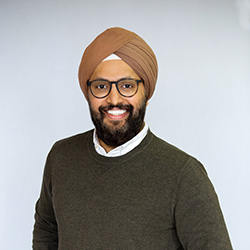
THE COACHING STUDIO
Education/Experience
2020 Organizational Coaching Graduate
Career Coach
Program Administrator
Team Lead
Bachelor of Education
Graduate Diploma, Business Administration
Before Angad became a coach, he thought he would be a teacher or an accountant. Born and raised in India, he would eventually settle in Canada where he earned his Bachelor of Education degree.
After finding work with Canada Revenue Agency, he landed a job at a Vancouver-based fintech company. Within nine months, he found himself leading a team as a senior accounting associate. “I really didn’t have the tools to do so at the time,” recalls Angad. “I just had my natural skills, or what I knew to be true about leading people. In hindsight, I was taking a coach approach in some ways.”
As Angad would discover, his approach worked. Among eight teams, his was one of the few doing well in engagement surveys. At that point, he realized accounting wasn’t what he wanted to do in his career.
An introduction to the president of The Coaching Studio, a global team of leadership development experts, led to a role as the studio’s coordinator in 2018. By then, Angad had also been working as a career coach for a few months. “I got really curious about coaching, building positive cultures, and scaling organizations,” he says. “I decided to invest in a coaching certification.”
Almost a year of conversations with other coaches and program team members of the UBC Certificate in Organizational Coaching, Angad applied and was accepted into the program.
As Angad explains, “I had started with another coach training organization before joining UBC. But what became very clear is relationships really matter to me, and I didn’t want to meet new people every module of a program. The UBC brand also carries a lot of weight.”
A visual, Angad gained a lot of value from the hours of hands-on client coaching sessions, and being coached by peers. He also speaks highly of the program’s balance of practice and theory. “UBC has an academic approach I appreciated, because that's the evidence-based research that sometimes helps organizations understand the value in coaching.”
Angad also had a few ah-ha moments while progressing through the program. “Coaching is not a one-and-done approach. We learned how to integrate coaching into day-to-day interactions. What rung true for me is that coaching is one of many toolkits, but one that we should be embedding more in organizations.”
Since graduating from the Organizational Coaching program, Angad has been promoted to Vice President of The Coaching Studio. He says, “I’ve been able to apply what I was learning at UBC in my coaching sessions with clients, and I’m building coaching programs for leaders. These coaching programs are deliberately shifting their culture to adopt a coaching mindset. And we're already seeing the massive results, one where it’s also helping organizations with retention and succession planning.”
He’s even noticed differences within his organization. “The biggest shift took place in my day to day conversations with the team,” Angad says. “I've only been growing since I left this program at UBC.”
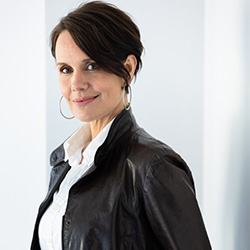
DEPARTMENT OF NATIONAL DEFENSE
Education/Experience
2022 Organizational Coaching Graduate
Bachelor of Arts in History
Bachelor of Education
From a very young age, Roxana has known she wanted to do something to connect more with humans and work in the human development sphere. She recalls, “My mom has a sweet recording of me when I was a kid and she asks me what do I like? And I say, ‘I love humans.’ And I’ve always just loved humans, that is my gift, to be able to connect with people from all walks of life.”
Roxana started on her desired path by getting a Bachelor of Education degree, but quickly realized being an elementary school teacher wouldn’t fulfill her. She started looking for other opportunities, and at the age of 21, she landed a job in the Federal Government in language assessment. Her role allowed her to work with various types of people from different professions, and sparked that appreciation of connecting with people. She progressed to other human resources and recruitment roles. ”I figured HR, that’s where the humans are, that’s where we take care of the humans,” she laughs.
In 2008-10 Roxana become a mother to two children. After her maternity leave she decided to hire a life coach to help her get back to work. “I had heard of this term ‘life coach,’ and just googled it. I found this woman who was offering 30-minute free life coaching. I was living in France at the time, and I call this number in Toronto. We have this one coaching session, and in that one session I felt a shift and thought, Wow! This is powerful!”
Roxana continued to meet with this life coach as she returned to the workplace and, a few years later was diagnosed with breast cancer, at the age of 38. She remembers, “I had a dream job offer working in human resources as a staffing advisor for the Department of National Defense. I was on the cusp of signing my offer letter when I got a call from my doctor. I had a type of breast cancer that If I had it 25 years before I would have died.” Several years of treatment in France, surgeries and recovery followed, during which she continued to receive support from her life coach and was prescribed sophrology therapy. As she explains, “Sophrology means harmony and consciousness…and it helps you with anything. It's all about connecting the body and the mind. It’s Europe’s best kept secret!”
After going through these difficult years Roxana realized that she wanted to bring all of her experience together, and help young women on their journey beyond breast cancer. She remembers thinking, “Women need support beyond treatment to bounce back into their lives, and I want to help them regain confidence and control.”
Over the next few years Roxana applied to coaching programs, then deferred each year as she questioned how she would balance the demands of motherhood, work, life and school. When Covid hit, she went to France and had the time to reassess. “It's almost like everything kind of slowed down again with Covid and I was able to pick up on those desires and say, okay, so what do I want to do with this?” Roxana started to look into opportunities and realized that a coaching community already existed in her organization. “A defence team coaching program that was born in the Department of National Defence (DND). These people were just championing coaching. I started to connect with them, and they're the ones that encouraged me to go and get my credentials.”
Roxana took the advice of one of the DND coaches to check out the UBC Certificate in Organizational Coaching program, “What I loved about UBC over executive coaching was the focus on organizational coaching. I knew I had a passion and a calling to help. I also had this parallel passion to help women thrive and surpass themselves in adversity. And the two met my desire to become a coach for my organization and for my desire to help women bounce back beyond breast cancer.”
While Roxana had many takeaways from the program, one concept stood out. “I recall this one day when we talked about embodiment, what a coach must embody, and just showing up with that embodiment. It's something that you exude for your client.” She adds, “The program was incredible, laying down a framework of what coaching is, how to take coaching to an organization. Having a support network was also important…receiving coaching from my cohort on topics. I think when it comes to leadership first you have to lead yourself. You can't just aspire for leadership roles without truly taking that leadership and accountability inwards first.”
Roxana is now using her organizational coaching skills at the Department of National Defence, where they have launched 400 executive coaching programs for senior leaders. She will also be leading team coaching programs in her workplace and advancing her skills with a Certification in Systemic Team Coaching. She has received a Life Coaching Certification from The Life Coach School, and has completed the first year of her Sophrology. Roxana is working on writing a book and creating a program for women who have recovered from breast cancer, to help them bounce back and create the most powerful version of themselves.
Says Roxana, “What I’ve learned with organizational coaching, life coaching and with sophrology is that we can all learn through hard times, and once we understand how to use our mindset, we can step into our own power and make amazing things happen.”
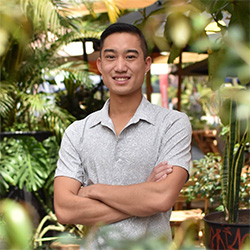
Education/Experience
2021 Organizational Coaching Graduate
Development Manager
Chartered Professional Accountant
Bachelor of Commerce
Like many young people growing up in the 90s, Casey Chung followed the path that his parents and peers expected of him: go to university, earn a degree, and get a stable, professional job.
But within a couple of years of starting his career at a multi-national accounting firm, it became clear to Casey that he didn’t want to be there. “I felt lost in my career, and started wondering what to do with my life,” he recalls.
A death in 2018 in his extended family marked the beginning of a long transition. At first, he tried to keep busy to suppress his growing anxiety. He eventually sought the help of a therapist, who was also a life coach. “I became enthusiastic about mental health, self-development, my creativity, working with people, and education,” explains Casey. “I didn’t call my therapy ‘coaching.’ I didn’t even know what coaching was.”
Two years after he started working with his therapist, the pandemic hit. “At that point, I realized there was an opportunity to help others,” recalls Casey. “I had put the work into myself, and I felt prepared to help.” During a session with his therapist, she recommended he look into the UBC Certificate in Organizational Coaching program.
“It’s really important to mention that I had a lot of doubts within myself,” says Casey. “I thought coaching was for 35 to 40-year-olds with life experience.” Despite his reservations, he applied, was accepted into the program, and quit his job.
Within days of quitting, the partners at his firm called him back, and asked him to come on as a performance development manager to coach and support the junior staff. “It was a really amazing opportunity to practise and help 80 ‘clients,’ all new to the organization and workforce, and joining during the hardest time of my generation. It ended up being a dream job.”
After he graduated from the Organizational Coaching program in May 2021, Casey turned his focus to building his own clientele with the goal of coaching full-time. Says Casey, “The UBC program helped me understand systems. And what I discovered is that I didn’t have enough support – nor influence – within my organization to change the culture. The system I was in was structured, hierarchical and regimented.”
Sensing an increasing resistance to change from his accounting firm, Casey quit again three months later to pursue his dream of full-time coaching to help CPAs, accountants in training and young finance professionals advance their careers without burning out. “Through the program, I could see the problem with burnout isn’t an office problem or even an organizational problem; it’s an industry problem. I do believe coaching will play a large role in change.”
Casey also attributes the Organizational Coaching program for helping him through an incredibly difficult period of his life. “For nine months, I was getting coached almost every single day by my cohort, mentors and experienced coaches. The feelings of not being sure of myself, getting stuck – those feelings were gone. I feel so much better equipped to make decisions for myself, for my family and for organizations.”
Since graduating in 2020 at just 25 years old, Casey has gone back as an alumni coach and guest facilitator for following cohorts. “A really key aspect for me has been the community. Everyone is extremely caring, non-judgmental, and open to support, learning and growth. It’s a very constructive community.”
Heading into 2023, Casey is planning to shift his coaching practice from one-on-one coaching to group, team and organizational coaching, with a focus on helping accounting and financial leaders. “The program gave me the foundations and frameworks of coaching, the practice, the feedback and tools like assessments. But the expectation is that you create your own experience, methods and ways of working with clients.”
He adds, “What I like about the coaching profession is you can make it your own business as a full-time job, or do it on the side, or use it in the workplace. The group, team and organizational coaching aspects will really pay dividends in the long run. And coaching is very much a skill you can use in life.”
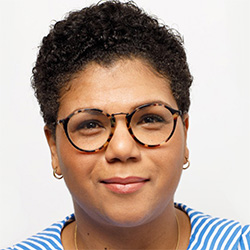
Organizational Change Management Consultant
Education/Experience
2021 Organizational Coaching Graduate
Prosci Certified Change Management Practitioner
Published Author
Lean Six Sigma Green Belt
Baccalauréat en administration des affaires
Like so many during the pandemic, Marielle de Vassoigne started searching for a better work-life balance. She had been working for close to 20 years in international change management consulting, and had done stints in Montréal, her native country of France, and Martinique, where she had grown up.
In 2020, without ever having visited Vancouver, she moved across the country from Montréal. “I change contexts easily,” she explains. “I thought perhaps I needed a new narrative.”
Marielle was also in search of deeper career fulfillment. She even considered a career change. After talking to a few coaches while in Montréal, she realized she wanted to remain in service to people in an organizational capacity. “What I enjoy most is adding value to a project team, mostly through one-on-one conversations,” says Marielle, smiling. “I love especially working with middle management on projects.”
When she decided to move to Vancouver, she began looking into ICF-accredited coach training for a professional context. Though she had some experience with informal coaching, she wanted to go beyond what she had been doing naturally as a consultant, and formalize her skills. “When I saw the UBC Certificate in Organizational Coaching, I stopped my research right there,” she recalls.
The program was her first social experience in Vancouver, and she made enduring connections and friendships. “One thing I appreciated so much was the diversity of the students, instructors and mentor coaches. I also related so well to the mindset of the program: openness, mindfulness, exploration, curiosity,” she says. “As someone from the French Caribbean, I like to think if the world had been full of truly curious explorers in the 15th century, the world would be a different place.”
During the program, Marielle experienced a few ah-ha moments. “Change consulting and coaching go so well together, I actually struggled at first,” admits Marielle. “I built my career on finding – and offering – solutions for people. As a coach, that’s the very thing I must not do. I still remember the moment during my third audited call that I realized one of my core values is to be useful and serve people. But one of the ways I can be useful is to get out of someone’s way.”
Now on the path to earning her Associate Certified Coach (ACC) designation, Marielle does pro bono coaching and volunteering for the Chambre de Commerce Francophone de Vancouver, and the new Vancouver Black Library. She also returned as an alumni coach for Cohort 13. In three to five years, she plans to take a sabbatical from consulting to coach full-time and write. Her second novel is due out in 2023.
“This program is for anyone who wants to bring change in their life – it offers a method and a mindset to embrace change. It also allowed me to go deep down inside myself, a process I had begun for my move across Canada.”
She adds, “I came to Vancouver to change my narrative – to explore languages, practices and people. I really feel I’m at the place I need to be now. Vancouver absolutely feels like home.”
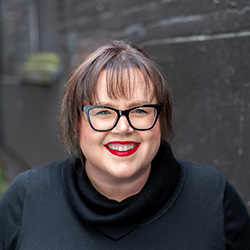
FUSE COACHING COOPERATIVE
KELS DAVIDSON COACHING
Education/Experience
2020 Organizational Coaching Graduate
2018 Human Resources Management Certificate Simon Fraser University
Kels started her adult life pursuing an education in social work and quickly realized that she needed more life experience to work in the field. Her realization led her into retail, where she would spend the next 20 years working in leadership roles. She reflects on how coaching was something she has always done, “I realized that through conversations and coaching colleagues within their roles, they were able to gain life skills – not just skills to make a sale in the moment.”
Kels eventually moved into human resources where she managed a health and benefits program for staff all over North America. This is the role where the wellness aspects really stood out to her. “So there was the benefits piece, which is quite technical… But there was also the wellness piece which was really focusing on how people take care of their mental health during different trials and tribulations. You could also just focus on yourself, and really kind of help to find ways to make you thrive.”
At this point in her career, Kels started thinking about what part of her job she really liked the most. “It always came back to seeing the people that I work with succeed. Getting them to a point where they got promoted or moved to different parts into their current path. And it was really through the conversations and coaching that I could see that happen for people,” she says.
About a year later, a colleague suggested Kels look into coaching and that is what got her on the path. She looked at a few different programs and coach training centres. She chose the UBC Certificate in Organizational Coaching program for a number of reasons. “What really appealed to me was, one, it’s one of the best universities, and I knew that there would be a standard, a high standard of education and support. UBC also had that organizational lens that looked at how you work with groups within a workplace or how to bring coaching into the workplace. The program really linked to what I wanted to do.”
Kels graduated from the program in 2020 and spent a lot of time coaching off the side of her desk. She was working on building her confidence, getting ready to really say “Yes, I'm a coach. This is what I do.” She maintained her friendships from the cohort, and together built a coaching cooperative called Fuse Coaching Cooperative to bring coaching to non-profits. By the end of 2020, she had achieved her Associate Certified Coach accreditation with the International Coaching Federation, and in 2021 transitioned out of her job and moved into coaching full time with a coaching platform called Better Up.
In this new full-time coaching role, Kels immediately became busy seeing incredible clients all across North America, which helped her find her specialization. “This really confirmed that my coaching niche is leadership development: working with leaders who want to increase their effectiveness as well as take care of themselves,” she says. “Because being a leader can be very draining and stressful, I do a lot around management, leadership skills, communication and those types of things with my clients.”
While she was in her new role, she also signed up to be an alumni coach and cohort leader with the Organizational Coaching program. She comments about what drew her back to being part of the program after graduating. “One thing that I love about being involved with the program – both being on the program team and connecting with new learners – is it’s such a community of support. It's unlike anything that I've ever felt before in a corporate setting, where it's just coaches. Coaches are kind, coaches are supportive, and you're constantly around people who are helping you be your best, and that's really wonderful.”
A-few things that really stood out to Kels about this program, “This is a lot more reflective. It's a lot more learning about yourself as you're learning to be in service to others.” She adds, “The cohort was filled with incredibly talented, insightful people who are there to do the same thing and grow and learn. They are such a supportive group. Everybody from the instructors to the learners. It was different from any other school that I had experienced before and very, very impactful in that way.”
She has this advice for others considering the program. “I think the biggest thing is, people are going to get what they put into it. And I would say that if you're willing to put in the work, the time and the vulnerability, you can do great things with it. That's the same with coaching. Clients are going to get what they put into it.”
She adds, “Who I thought I would be and what I thought I would be doing when I entered the program is very different from what I'm doing now. But what I'm doing now actually surpasses what I thought I could be. Which is great!”
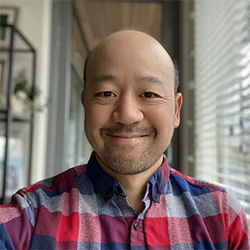
ADRIAN LIEM COACHING
FOUNDER, ASHIBA
Education/Experience
2020 Organizational Coaching Graduate
Certified Scrum Master
Bachelor of Education
Bachelor of Arts in Psychology
Adrian Liem has always had an interest in people and psychology. He has an undergraduate degree in psychology, and did teacher education. At one point he had seriously considered becoming a counsellor. His father talked him out of it knowing Adrian’s level of empathy and sensitivity would make it difficult. “I recognized that I didn't know how to hold space for people as they're processing some really deep things without also getting pulled into it myself.”
Adrian stumbled on coaching through an interaction with a friend who was a coach, and he became involved in her group coaching sessions, “I was explaining the stagnation I felt in my career and the need for something more and she asked me questions in a different way. I was experiencing something very different. A different way of learning, of interacting with people, it was a peer support type of environment.” This experience sparked his curiosity and is what prompted Adrian to eventually apply to the UBC Certificate in Organizational Coaching program.
Once Adrian started the program, he was able to solve the dilemma of balancing his feelings while being in service to others. “In the first couple of days, there was this light bulb that turned on for me, an epiphany of how I can be with people in a way that is different. It's still joining them in a space, but there's a method behind it, there's a framework, there's a way of managing that for myself, and that kind of kicked off the whole journey that has been continuing since then.”
When Adrian began the program his goal was to find a new career path that allowed him to use technology to support people’s growth. “I viewed the program itself, as a way for me to understand the mechanics around what coaching does. The outcome I was looking for was to apply that knowledge in a way that I can create something that melds my digital background with my interest in people,” he says.
Adrian also wanted to be able to use the coaching knowledge in his current role as a Digital Comunications Manager to manage his team more effectively. He explains, “I have a big C coach role that I play where I am coaching but I also have a little C coach role where I'm bringing a coach approach and holding true to the principles, and the values, and the way of being as a coach. This is changing the way we work, it’s changing the way that people collaborate with one another, it’s opening things up.”
Adrian reflects on some of the things that really stood out to him. “Through the program we really learned a framework with an academic foundation to it that can generate measurable impact, and not just for individuals, but for groups and teams and broader systems.” He also felt the level of support in the program was significant, “The size of the program team, the people that have a hand or a part in the journey in this, it's amazing. There's nothing as far as I'm hearing of other coach training programs that comes close to the community and years of experience that you get exposed to through this program. I was coached by so many different people, practiced coaching with a diverse range of clients, was mentored by leaders in the field, and am now part of an amazing community.”
After completing the program in 2020, Adrian has kept very busy. He says, “Professionally I just had my job before, but now I have pockets of little networks of groups that I work with in different types of roles in different capacities.” Adrian does alumni coaching for the program, he is a UBC internal coach and has done coach consulting with various organizations in the health and technology field, as well as running his own coaching consultancy. Adrian is also pursuing a master’s degree in applied positive psychology and coaching psychology.
Adrian recommends this program to, “anyone who is trying to have more meaningful interactions with whatever circle they are part of whether that’s with a big C Coach or little C coaching role.” He adds, “I also think any leader, anyone who is leading people, has something to gain from some coach training.”
His experiences have led him on a path that he initially hadn’t anticipated. “Coming out of the program, the process got me to a totally different spot than I expected,” he recalls. “I have a good idea of where I'm going, but it started a whole new way of thinking about how I work with people. It also got me deep into the world of coaching, into the theory, research and practice of providing coaching to people in a variety of ways. Where I'm at now has far exceeded my expectations, and I feel like the journey is still not done.”
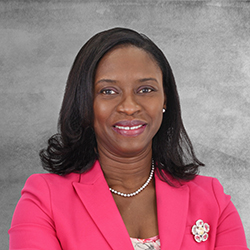
Education/Experience
2019 Organizational Coaching Graduate
Adenike Oyenuga, is a graduate of the 2019 UBC Certificate in Organizational Coaching program. She’s a performance development manager with an airline in the United Arab Emirates, and shared her experiences in the program with us.
What lead you to pursue the UBC Certificate in Organizational Coaching?
I manage a large team and I hold performance conversations with team members to set expectations and support individual and collective development. I needed a robust, varied and well-kitted communication toolbox for our conversations to be effective and have meaningful outcomes. I have found coaching to be an extremely helpful tool in navigating different conversations and harnessing the potential of my team.
Why did you choose an organizational coaching credential?
I love that organizational coaching approaches coaching from a holistic and systemic point of view. As an organizational coach, your focus is on how systems work individually and collectively.
Was the time, effort and money worth it?
It was worth it. Not only did I gain the skills I was looking for, but I also connected with a wider community of coaches. This was key to my understanding of being part of a whole, and working in a system. UBC has also provided opportunities for alumni coaches to participate in events and apply their coaching skills.
What surprised you about the program?
UBC’s commitment to the continuous support and development of alumni coaches is both good and unexpected.
How do you apply your skills in your role and life?
I actively use coaching in my role and have also offered coaching sessions to colleagues. I’m partnering with a colleague to deliver a coaching workshop for leaders on my team. I also offer pro bono coaching.
How have things changed in your life and career since taking this program?
The program has improved the quality of conversations I have. I am a better listener and more self-aware, and I make fewer assumptions. At work, I have a richer toolkit to navigate challenging conversations and to ask questions for clarity.
Can you describe a recent coaching engagement?
I coached an acquaintance who lost her job during the pandemic. She was going through stressful times. Our long-term coaching engagement helped her gain self-awareness about limiting thoughts and behaviours that were impeding her progress. She found the intervention helpful.
What is your advice for someone considering this program?
The coaching program was intense. I had to deal with the huge difference in time zones, plus I work full-time. I was also taking another certificate course at the same time. Determination, time management and planning were key.
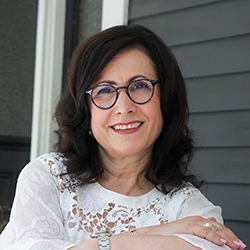
BC WOMEN’S HOSPITAL AND HEALTH CENTRE
Margaret Seppelt is the Director of Strategic Transformation and Improvement at BC Women’s Hospital and Health Centre. She is an expert in adopting Lean/Continuous Improvement as a strategy to achieve organizational excellence, and has trained hundreds of healthcare leaders, physicians, nurses and staff in Lean and Quality Improvement. Margaret shared her experiences as an organizational coaching student with us.
What led you to pursue the UBC Certificate in Organizational Coaching?
I entered the UBC Certificate in Organizational Coaching Program with more than 25 years of expertise developing strategies and systems that foster a culture of continuous improvement, and achieve organizational excellence in health care. After years of supporting leaders in adopting new management systems and approaches, it became apparent to me that while management methods and tools are easy, what is challenging is the associated behaviour shift.
If I was expecting to coach leaders to shift their mindset and behaviours, then the shift had to start with me. It was time for me to move from being an expert advice giver, to a coach.
Why did you choose an organizational coaching credential?
Organizational transformation happens with people, and it was important for me to learn the practice of coaching individuals, teams and the organization. The UBC program provided me with an incredible breadth of knowledge and guidance by coaches who are experts in their field. I wanted to learn the difference between consultant, facilitator and coach, because these were terms that I often used to describe myself. I was seeking to deepen my understanding of the theory and practice of coaching, including how frameworks, approaches and competencies are applied in organizations.
My goal was to become a skilled coach so I could be more effective in supporting leaders to deepen their awareness of their personal values and principles, and how they show up in their daily interactions with others.
What skills did you gain?
The program provided me with the opportunity to develop my competencies through repeated individual and team coaching sessions. There was a great balance between active practice and written reflection, which was critical because becoming a coach is to be in service of others, and requires a lifelong commitment of deepening self-awareness and continuous learning.
The skills that I have gained as a coach have enabled me to shift from being the advice giver working with people from my truth, to working with people from their truth, and create a space with mutual responsibility to help them gain insight and define action.
What, if anything, surprised you about the program?
As someone who started her career as a nurse, what surprised me was that coaching ethics and standards are not unlike those in nursing. I was supported by a network of dedicated coaches who model coaching with distinctive styles and perspectives while maintaining high standards for coaching as a profession.
What effect has this program had on your professional role and life?
Coaching has had a profound impact on all aspects of my life both personally and professionally. Completing the UBC program has shifted me from being an expert back to humble beginnings.
The program made me acutely aware of my own mindset and behaviours, and the impact that I was having on my environment and others. I am now more aware and thinking more deeply about what is going on around me. I have increased my capacity to listen, and find myself showing up more calm, present and curious in all aspects of my life.
I am better at displaying respect and humility knowing that I will never be an expert. It’s impossible for me to be able to see everything my client is able to see from their point of truth. I have consciously given up the habit of dispensing advice and am hopeful that, with more reflective practice, I will continue to deepen my understanding of my own patterns and behaviours and the impact that they have on others.
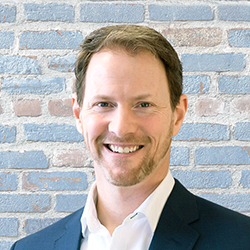
MACDONALD SEARCH GROUP
Education/Experience
2019 Organizational Coaching Graduate
Recruiter/Coach
Trevor Baker, ACC, is a senior consultant and partner at MacDonald Search Group in Vancouver, and is a graduate of the 2019-2020 UBC Certificate in Organizational Coaching program. He’s a recruiter and coach, and is working toward his Chartered Professionals in Human Resources designation. Trevor offered his perspectives on his experience in the organizational coaching program.
What led you to pursue the UBC Certificate in Organizational Coaching?
My organization, MacDonald Search Group, was in the early stages of a generational leadership transition. We were also adding new consultants and offices across the country, and we needed a way to ensure the consultants had support to roll out our process nationally. When I looked at my resume and my future leadership role in the organization, I needed to ensure my leadership and coaching style was the best it could be in a people-first organization like ours.
My clients also need the best of me, and for a long time I felt like I was only “okay” at coaching them. I took the program to up my game and learn frameworks and techniques, and acquire tools to assist me in delivering against those priorities.
Why did you choose an organizational coaching credential?
I chose organizational coaching because it aligned better with my overall goals. I felt that supporting the smooth functioning of a group of people is more complex and demands more sophisticated skills than coaching one person towards their objectives. Organizational coaching reflects better how companies work. The amplifying effect of helping people succeed together is also highly rewarding.
How did you determine this program was the right fit for you? What were your checkboxes?
I wanted a lot of opportunities to practise and learn coaching new techniques and skills in a safe environment – check! I also wanted a program that led to accreditation – check! Lastly, I wanted a great cohort of like-minded people to grow and develop with. The people and instructors in the cohort really made the difference – a highly intelligent, highly motivated and engaged group of people – wow, what a group. I learned as much from them as I did from the content of the program.
What skills are you hoping to gain?
I went in hoping to gain a more robust foundation for coaching and developing people as individuals and in groups. I came out with that, as well as with a significantly more robust understanding of myself and how I work with others.
Was the time, effort and money worth it?
It was one of those classic, “what you put in you get out of it” kind of scenarios, so yes the time and effort were worth it. The return on investment has been there for me because my ability to provide value yielded far higher billable revenue in part because of the program.
What, if anything, has surprised you about the program?
There were plenty of surprises! First was how emotional it got, for myself and others. When coaching is done right, it really digs into some challenging areas. This was a surprise as most of my previous leadership and coaching training was done in a “sanitized” corporate environment.
This program created a safe environment that allowed people to really open up and it was amazing and genuinely enthralling to see people have substantive personal changes while learning to be coaches. Another surprise was how academic it was. There was a lot more paper writing than I was prepared for. I really had to think deeply in a way I wasn’t used to, which was intellectually challenging, in a good way.
What have you gained personally and professionally from the program?
I gained huge insights into my ethics and values, as well as a whole new framework for working with people which has been especially helpful working inter-generationally within my organization. My relationships are better across the organization, and with my family. I’ve approached challenging relationships in a new way with great success, and I’m able to reflect in a much deeper way on problems and challenges than I did before. My clients have had substantially better experiences and the outcomes have been amazing because of it!
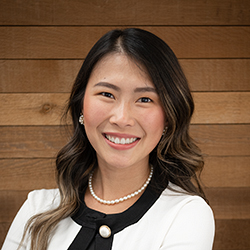
SLACK, VANCOUVER
Stephanie Hoi, is a 2019 graduate of the UBC Certificate in Organizational Coaching program. She’s a customer experience specialist at Slack in Vancouver, BC, and shared her reflections and experiences in the program.
What led you to pursue the UBC Certificate in Organizational Coaching?
I was going through major changes in my life. When I immigrated to Canada, I had the opportunity to open myself up to new possibilities. I took a short course to learn coaching as I believe coaching is such a powerful tool for self-awareness and development. I gained confidence and empowerment in that course, and I knew that I wanted to continue learning about coaching, and use the knowledge to help others.
Why did you choose an organizational coaching credential?
I chose organizational coaching because my background is business and marketing. I wanted to learn coaching skills while using my experience working in organizations. Doing the program in a recognized university was important as well, and I know UBC has a high reputation.
Organizational coaching not only helps individuals improve, it causes a ripple effect on other systems, the people they work with, and potentially the organization as a whole. With commitment from all levels of the organization and the guidance of coaches, this interconnection could lead to a positive and permanent change in a company’s culture.
What, if anything, surprised you about the program?
I enjoyed the Mentor Coach calls. They really helped me assess my progress as a coach. I was impressed by the support of the program leaders and all the Mentor Coaches, and their availability to answer questions.
What are you doing with your credential now? How do you apply your skills in your role and life?
What I found the most appealing about this program is the network and connections we build in this community of coaches. I’ve exchanged with so many peers and worked with mentors, and we all learn from each other and share important resources. This program has given me the knowledge and skills to pursue a career as a coach.
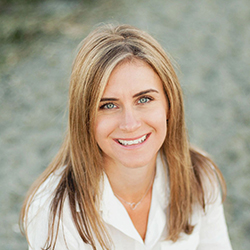
THE VILLAGE RESTAURANT, VANCOUVER
Adele Fraser is a 2019 graduate of the UBC Certificate in Organizational Coaching. She’s Director, People and Culture at The Village Restaurant in Vancouver, and Founder, Adele Fraser Coaching.
We reached out to Adele to talk about her experiences in the Organizational Coaching program, the results she’s seen organizational coaching provide and how her personal and professional life has changed since her graduation.
What led you to pursue the UBC Certificate in Organizational Coaching?
I had been looking at coaching programs for a while when I came across UBC’s program and recognized what a great fit it was for my career and future aspirations.
Why did you choose an organizational coaching credential?
As an educator and human resources manager, I am often working with teams, groups and systems. The added layer of experience in UBC’s program with organizational coaching was a great fit for what I was looking for. Organizational coaching achieves the same results for teams of people that 1:1 coaching achieves for individuals.
Was the time, effort and money worth it?
Absolutely! The time requirements for participation in the program were very reasonable. I work full time and was able to meet all deadlines and participation expectations. All aspects of the program were interesting, engaging and contributed to my learning.
What, if anything, surprised you about the program?
I was surprised with how quickly I made real and authentic connections with other students, instructors, mentor coaches and alumni coaches. Everyone I met in this program was warm, inviting and helpful and had valuable contributions to offer!
What challenges do organizational coaching skills help address? In what circumstances might you use coaching?
I have used OC to support an existing team to create alignment, connection, understanding and ultimately a feeling of teamwork in an existing team. I also used OC to create the group agreements required to facilitate future productive work for a new team in the forming stages of their development.
What are you doing with your credential now? How do you apply your skills in your role and life?
From the day I began the program, the experiences that I had and the knowledge and skills that I gained contributed to every aspect of my life. This program really helped me focus on two questions: How am I serving as a listener? What question can I ask to add value to this person or situation?
I use my coaching skills at work to solve problems, support individuals with their development and give teams the framework and support they need to move forward and be productive. I have also successfully opened my own practice and work with teams and individuals in that way as well.
What has changed in your relationships and interactions at work?
My experience of UBC’s program and coaching have allowed me to untangle more easily intentions and desired outcomes in challenging or developing situations. This has provided a lot of ease with communication and interactions! While this has been valuable in all areas, the most unexpected place I noticed it showing up was in conversations with my teenagers.
How has your coaching practice changed?
Completing this program and other requirements for achieving the ACC designation through the ICF has given me the confidence to work with groups and individuals as a coaching practitioner, as an employee and an entrepreneur.